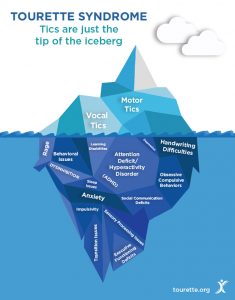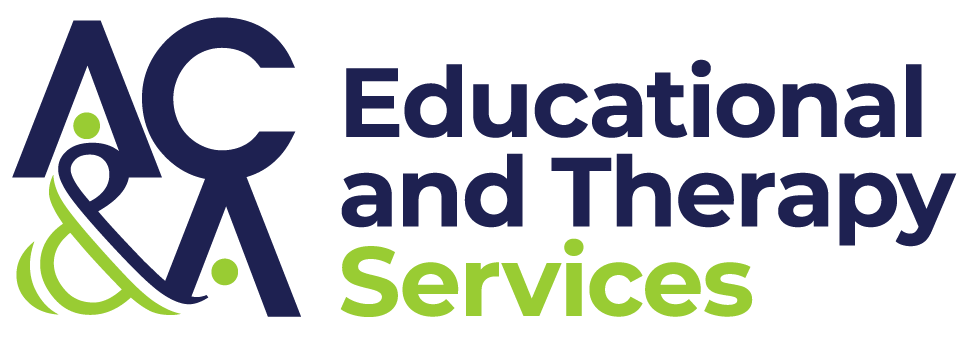
A sudden jump, eye-roll, cough, or even a swearing word… These are some of the involuntary tics that characterize and sometimes even stereotype symptoms of a neurodevelopmental disorder called Tourette’s Syndrome.
Tourette’s is a chronic condition that usually starts during childhood. It causes a person to make involuntary sounds and movements called: TICS! Tics can be either Motor (blinking, jerking, shrugging shoulders etc.) or Vocal (humming, yelling a word or phrase, swearing etc.) and are usually worse during stressful or exciting times.
Tics and other symptoms may improve after years or in some cases, go away completely. However, they can also reappear.
 Tics are just the superficial characteristics of Tourette’s Syndrome! A person with Tourette’s Syndrome may also suffer from other challenging disorders that are hard to spot by people who are not familiar with this disorder:
Tics are just the superficial characteristics of Tourette’s Syndrome! A person with Tourette’s Syndrome may also suffer from other challenging disorders that are hard to spot by people who are not familiar with this disorder:
- Attention-deficit/hyperactivity disorder (ADHD)… is the most common co-occurring condition among children with TS. Children with ADHD have trouble paying attention and controlling impulsive behaviors.
- Obsessive-Compulsive Disorder (OCD)… can be easily misinterpreted as a complex tic: Thinking about, saying, or doing something over and over. More than third of people with TS have OCD.
- Anxiety and Mood Disorders (Depression/Bipolar Disorder)… are more common in TS patients who also suffer with ADHD and OCD. However, mood disorders or anxiety can also be triggered due to emotional distress and loss of self-esteem, which can result from living with TS.
- Rage Episodes… are more likely to happen with people who have more severe TS symptoms, especially when they are tired or sick. These episodes are unintentional explosive outburst that are out of proportion to the triggering event. The frequency of the outbursts may vary.
- Sleep Disorders… are common in as many as 60% of people with TS. This can not only be caused by alterations in brain structures or neurotransmitters due to TS, but can also be associated with the ticcing, with conditions like ADHD and depression, and even with medications used to treat TS symptoms.
- Learning Disorders… may also be cause by co-existing symptoms like OCD or ADHD or can also be developed due to the tics that may disrupt concentration and visual spatial attention, also interfering with reading and writing skills, including handwriting.
- Speech or Language Disorders… may be associated with vocal tics, such as stuttering for instance.
Although TS has no cure, TREATMENT can help manage symptoms and disorders caused by TOURETTE’S SYNDROME:
- Behavioral therapy –Cognitive Behavioral Interventions for Tics, including habit-reversal training, can help monitor tics, identify premonitory urges and learn to voluntarily move in a way that’s incompatible with the tic.
- Occupational Therapy – If tics, ADD or OCD cause limitations or interruptions to daily life activities or ‘occupations’ caused by TS, then Occupational Therapy can be beneficial.
- Psychotherapy – It can help not the patient only cope with TS, but also with other conditions such as ADHD, obsessions, depression or anxiety.
It’s also important to raise awareness in the community in order to avoid misconception and even bullying, which increase the risk of Social Phobia, Anxiety and Mood Disorders for people who suffer with TS.
If you are looking for a diagnosis or any of the Treatment Options mentioned above, you can schedule a Live Video Consultation and Teletherapy at www.acandassociates.com .
You can also find us on our Social Media Channels:
We look forward to helping you through your journey of healing and wellness!

